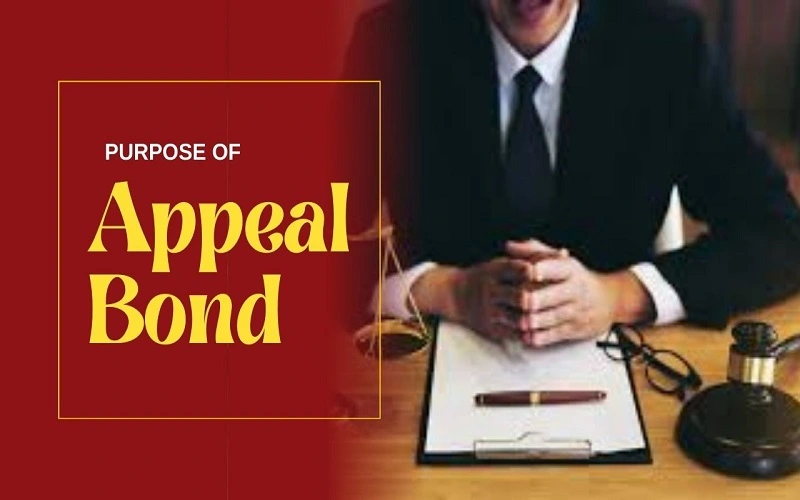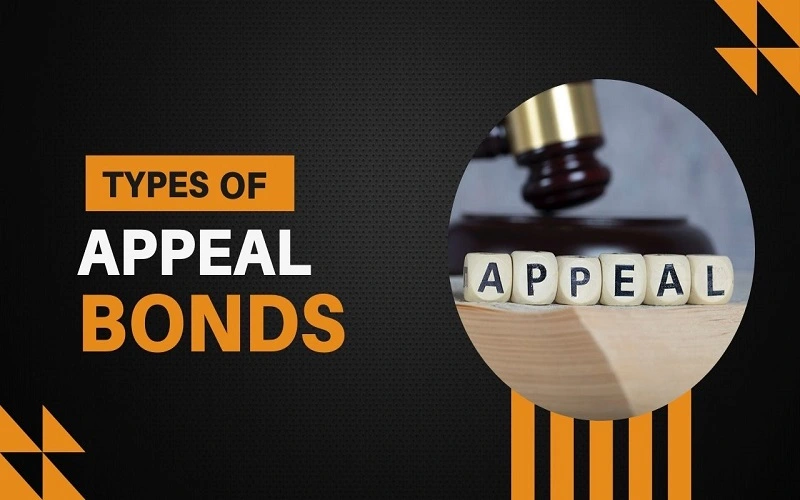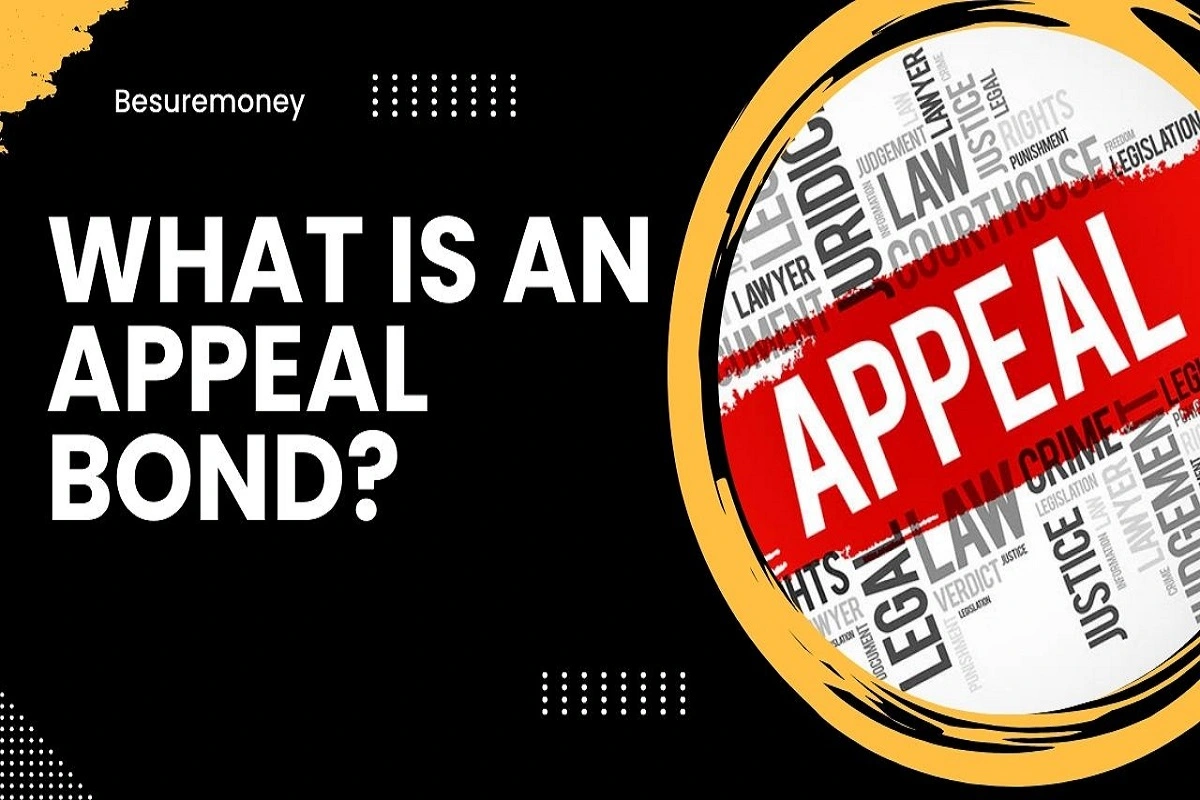Now, an appeal bond is one of the very important parts of the legal system but still people are not that aware of this. In some instances, an appeal bond is required to challenge a court decision so that the verdict is going to be upheld during these proceedings. If you want to move through the legal process with more confidence, read on and find out what appeal bonds are. This blog post will discuss appeal bonds, what they are, and why they matter.
What is an appeal bond?
An appeal bond is a type of surety bond that is posted to appeal or delay the enforcement of the judgment until the appellate court makes the decision. For the appellant, it is a financial obligation to ensure that if you lose your appeal from the original court decision you will now have certain monies at stake. This bond is supposed to protect the prevailing party (appellee) so that payment or satisfaction of a judgment will be made while an appeal is being heard.
The court requires the appeal bond to stop frivolous appeals that could slow down justice or increase legal expenses. That is essentially a way to guarantee that the party appealing does want to appeal and that they have enough money to pay for the punishment.
In simple terms, an appeal bond is an assurance in the form of money saying to the courts we will meet their decision but let them know we disagree by challenging it.
Purpose of appeal bond:

An appeal bond is a type of surety to insulate the winning party from any damages resulting from the movant having proceeded with his or her case further up on appeal. Although a filed appeal may still enforce the court’s judgment, The appeal bond guarantees that the party who won in court will get what the judge granted if they win the case.
An appeal bond discourages frivolous appeals. Fees mean that an appellant has to put their money where their mouth is, deterring those with weak cases from lodging appeals. It ensures that the legal system is filled with manageable appeals and that justice is served more decisively.
Put simply, an appeal bond acts to ensure compliance with the court’s decision on behalf of the appellant in case they do not win their appeal thus protecting potential financial loss by giving protection against a pending or final judgment.
How does an appeal bond work?
If a person wishes to appeal their court decision they may be mandated by the court, to obtain an appeal bond. The process is normally initiated after the court delivers a judgment and the losing party decides to trial it for them. This will prompt the court to potentially require that an appeal bond be filed along with petitions for appealing a case.
Here is how it works:
Filing for an appeal bond:
The appellant is expected to seek or pursue the bond from a surety company. The court determines the amount of the bond, which is usually equal to the initial judgment if all interest and costs are included.
Posting the bond:
The appellant posts the bond with the court as soon as it is approved. This bond is a monetary assurance that requires the appellant to post it with his appeal if he/she loses, so as not to be made good on the original judgment.
Appeal process:
While the appeal is pending, to enforce the court judgment. Although the appellant does not need to pay the judgment charge immediately.
The outcome of the appeal:
If the appeal is successful:
In this instance, the court’s original decision is reversed or changed, and therefore the bond will be released, whoever appealed does not have to pay out a judgment.,
If the appeal is denied:
The court will maintain its original ruling and the bond will be used to pay the appellant’s judgment.
In summary, the appeal bond is a crucial segment of an appeal that secures enforcement protection for the winning party until appellate courts review previously adjudicated matters and issue opinions or rulings on such issues.
Cost and financial implications:
Unfortunately, getting an appeal bond will represent additional costs and potential financial calculations for the appellant.

Bond expense:
An appeal bond generally costs a percentage of the full judgment against you. This percentage will differ but normally it is between 1% and up to 10% on the compensation granted. In the case of a $1,00,000 judgment by the court, the appellant could pay anywhere from $1,000 to $10,000, depending on factors like the appellant’s creditworthiness and the surety company’s terms.
Who pays for the bond?:
These terms are used for the bond which they have to pay. This charge also includes fees above and beyond any fees for an attorney or otherwise about the appeal. If the applicant can’t pay for the bond, it might be impossible to go forward with an appeal because of this sort of requirement by such a court.
In summary, an appeal needs an appeal bond but only if it handles the mean money within which an application bond falls.
What are the types of appeal bonds?

There are different types of appeal bonds, each serving a specific purpose depending on the nature of the appeal and the court’s requirements. Here are some types:
Supersedeas Bond:
This is the most common type of appeal bond. A supersedeas bond is a tool by which the payment of the court judgment in place can be delayed until after an appeal has been decided. It protects the appellee, in that if the appellant loses on appeal it still has some assurance of getting its judgment paid. The bond amount typically represents the entire judgment all interest and costs that could occur during your appeal.
Cost bond:
A cost bond means to satisfy the costs of an appeal, including court fees and other legal expenses. By posting this bond, the appellant guarantees that if they lose on appeal and cannot pay for any resulting costs then the appellee is not left with nothing. This was generally mandatory when the court had serious worries that this appellant could not keep costs.
All three types of appeal bonds help protect different parts of the legal system and will allow an appearance to proceed legally for all concerned. The court may also issue orders for these bonds to be posted depending on the particulars of the case before they will allow an appeal.
What are the benefits of appeal bonds?
Protection for the appellee:
The main reason for an appeal bond is to protect the appellee. The appellee is ensured that they will get the judgment amount if ever the appellant loses, thus preventing injustice due to delays in proceedings.
Delay in judgment enforcement:
If you are the appellant an appeal bond can delay the enforcement of a judgment from the court against the client. This might allow the person appealing to prepare just in case they lose the appeal and are looking to pay that judgment.
Promotes Fair Play:
Using an appeal bond helps prevent frivolous or non-sense appeals The introduction of a fee for appealing means that only the strongest and most genuine cases proceed, which again benefits the administration of justice.
In summary, if appeal bonds carry some financial risks for the appellant, they also entail several protections and security features that help to respect in part the legal system.
Conclusion:
Understanding An Appeal Bond These are bonds paid for by the losing party to protect the winning side that guarantee compliance with whatever order or judgment a court issues as proceedings are held on appeal. Appeal Bonds generally are not cheap, and carry their own set of risks, but offer an avenue to facilitate delay in the enforcement of judgment as well as act somewhat as a collar on frivolous appeals. Appellants can smoothly go through the appeal process by taking the correct measures to get an Appeal bond
FAQs:
Q1. How much does an appeal bond cost in NY?
Ans: For appeal bond costs in New York, an appeal bond is generally set at anywhere from 1-10% of the total judgment. I mean, if the judgment is $100k it might be anywhere from $1k to $10k for a bond. That split will vary based on your credit history and financial situation.
Q2. What happens after an appeal is affirmed?
Ans: Affirmed: when an appeal is affirmed it means the higher court agrees with the decision made by a lower court. Once the appeal is approved, then the judgment that was entered stays as it stands and you were ordered to do so by this judgment.
Q3. How do most appeals reach the court?
Ans: The vast majority of appeals find their way to the court in instances where one party allegedly lost a legal dispute before another, lower court and now believes that the ruling was in error. An appeal is initiated by the filing of a notice of appeal with the court that made the original decision, This notice alerts the court that they would like a higher court to examine their case. The appellant writes down reasons, called briefs for why the appellate court made a wrong decision. The Appellate Court looks at these arguments, as well as the records from the lower court decide whether the original conclusion gets accepted or modified.
Q4. What not to say in an appeal letter?
Ans: Do not blame, disrespect others, make excuses, or talk without facts in an appeal letter. Stick to the facts, and be respectful and straightforward about your situation.
Q5. What are the chances of a successful appeal?
Ans: Appeals are not successful in many cases. Appeals rarely prevail unless a basis is found for them on the grounds of something like a legal error in an original trial or new evidence surfacing. More often than not, appellate courts affirm the initial ruling unless there is good reason to reverse it.
